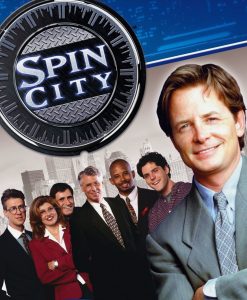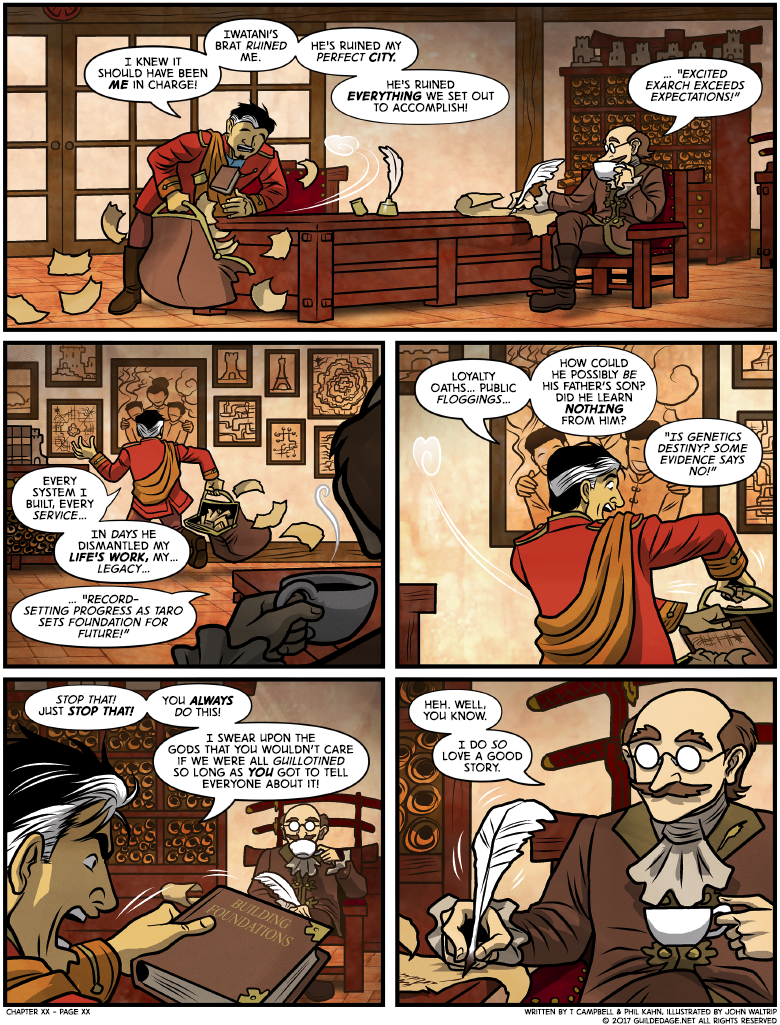Annotated 48-8
 This is the last we’ll actually hear from these two, and they’re the last shreds of the old Hall of Houses left to look in on—everyone else is dead, withdrawn, kicked out, or in the war room. Both of them sense the end is near for life as they know it, and probably just for their lives, period. (Miyamoto’s death will come later, as a bit of a historical footnote, but I can’t see Penk pardoning either of them, regardless. Bedard has one more, wordless, panel in a few more pages.)
This is the last we’ll actually hear from these two, and they’re the last shreds of the old Hall of Houses left to look in on—everyone else is dead, withdrawn, kicked out, or in the war room. Both of them sense the end is near for life as they know it, and probably just for their lives, period. (Miyamoto’s death will come later, as a bit of a historical footnote, but I can’t see Penk pardoning either of them, regardless. Bedard has one more, wordless, panel in a few more pages.)
There’s some grim satisfaction to be found in that, in watching secondary villains get some karmic justice. But we were more interested in showing their humanity, their more respectable aspects. For instance, Miyamoto, who’s often been an impotent racist, is here attacking fellow human Taro instead of the nonhumans nearing the gates. And he’s correct in almost everything he says. There’s still a bit of ego to him (my perfect city, my legacy), but public floggings are bad. For all the problems he turned a blind eye to, at least he knew enough to make most Gastonian citizens feel like they were in a land of opportunity, not tyranny. He even implies he admired his old rival, Iwatani Sr., for the latter’s own grasp of statecraft.
As for Bedard, he’s smart enough to see what’s coming, and he won’t run from it. He’ll spend his last hours doing what he’s loves, composing headlines that excuse current policies. He’ll never get to print those headlines, but that’s not the point. It’s all about the art of the spin. As long as he has his art, then even at the end, he’ll never be alone.
FB: “In retrospect, paying those adventurers to find and return MY offspring but also IWATANI’S child was an investment I regret.”











As Shakespeare might have put it, “Now graceless leaves His Grace Miyamoto!”
Bedard has one more small bit at Chapter 49-13. Frankly, I seem to remember the little creep comes out on top in the end, but apparently I got that wrong. He’s not in the movable type scene.
Ah, you’re right. Let’s fix that…
I got a different, creepier take on Bedard. He seems so dead inside here; a proper psychopath with no real empathy, just repeating his headlines on a loop like a worn-out record player.
Same here. He’s just unconcerned with anything but the story. Who lives, who dies, none of it matters as much as him getting to write about it.
Yeah, never got the guys motivation. Was originally thinking that Bedard saw himself as a king maker as many yellow journalism heads in the past (and present) but he just seems to stop and watch the world around him burn in his last few appearances.
Bedard is just really good at seeing all sides to a story…
Bedard seems to be set up very deliberately to parallel HR, as if he were Arkerra’s HR before all the mathemagic occurred. There’s a direct compositional setup parallelizing him to HR in his last appearance.
So. Alarmingly. Disturbingly. Relevant. Today
-“Our house is on fire”
-“IS THIS OBSESSION WITH FIRE THE NEW MASTER PLAN OF THE RADICAL LEEBS TO DISTRACT US FROM WHAT REALLY MATTERS???”
-“Dude… seriously. Your clothes are starting to catch on fire! Your hair, too!”
-“ARE FLAMES THE NEW CLEANSING SECRET BIG SKINCARE DOESN’T WANT YOU TO FIND OUT ABOUT??? ARE MILLENIALS CANCELLING FIRE, NOW???”
That’s about the vibe I’m getting from Bedard, here, too. With one difference: I find the reactions you describe somewhat easier to explain (though not to agree with): It’s an obsession with not directly taking sides, an inability to understand the gravity of what’s going on, a habit of “seeing behind the story” or something, coupled with some economic incentives and one’s own need to believe that it’s not going to be so bad (and therefore anyone claiming it *was* going to be so bad must be exaggerating).
I would have loved to figure out what’s actually behind the fact that Bedard was a very willing accomplice in a lot of the political plots, and why he would have supported them the way he did — he must have had some end that he wanted to achieve. Even in this scene it seems like he’s just making fun of Miyamoto because he believes he still has some ace up his sleeve — which he does not. So then … why actively join the conspiracy to ruin everything if you neither believe their ideology nor have anything to gain from them? If it’s just about the funny headlines, then he could have ruined Iwatani’s power grab just as easily, and possibly gotten a lot more mileage out of that, including a longer life for himself.
The Altruists had more of a vested interest in untruth than the mostly honest politicians they displaced. Bedard could make his headlines more truth-bending, and therefore funnier (to him), under their regime than otherwise. On top of that, on the rare occasions when he gives fairly straight answers, Bedard does seem to honestly support dictatorship over democracy. His day-to-day existence of manipulating the masses has probably left him with little faith in government by the many.
I really wish we’d got some explanation of what Bedard is doing here. This scene feels to me like he’s building up to some sort of punchline where he explains something to Miyamoto (and the reader) that he doesn’t yet know. But nope, he’s kind mocking him, and the concept of reality (and the reader?).
Yeah, that’s it. The villainy of Bedard is that he truly does not care about anything beyond his own gratification, and he achieves such gratification by his form of “storytelling.”
My original take on this scene was that Bedard expects to come out on top. His headlines support whoever’s in power under the guise of objectivity. He sports a neutral facade and will change sides when needed.
Same. Ever since he helped Itwani take over, the guy had me on edge because it seemed like he had something up his sleeve, but that never materialized.